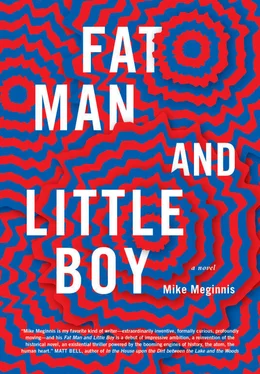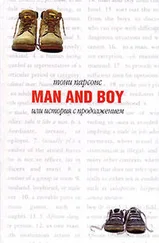Matthew unfolds his legs and stands up. “This is no good.” English again. “You’re not quiet.”
“I’m sorry,” says Claire. “I’ll do better.”
“We’ll go out and play,” says Matthew, in French. “We’ll play until you’re tired and out of breath. Then we’ll come back and try it again.”
“I’m sorry. You know how I get.” She doesn’t know what this means, but Matthew nods, so apparently he does know how she gets; apparently, she gets some way.
He leads her back into the day. The sun is falling in increments, but the hotel people are still about, some of them playing horseshoes, lawn darts, and badminton, while others sleep or lounge. Gay colors, light dresses, low necklines, suit pants without jackets, slacks, comfortable shoes, slippers worn out-of-doors.
“Why are there so many now?” says Claire.
“Babies,” says Matthew, in his clumsy French. “A young couple lives here. She got a baby even though they didn’t think she could.” He motions at the rest of them. “Their friends, and the friends’ friends. They want to get babies too. But it takes a little while.”
One of the wives sits in a cane chair, rubbing her small tummy through a baggy maternity dress, while her husband pours her a glass of slightly brown-tinged water from a bottle.
“How does it happen?” asks Claire.
The woman drinks the water, screwing up her eyes as she glugs. She shivers once in her neck and shoulders as the last drop disappears.
Matthew shrugs. “No one’s sure. The water,” pointing to the wife in the maternity dress. “The air. The mud. The food. The ghosts. Could be anything.”
“Ghosts?”
“Dead Jews,” says Matthew. “Come on. I want to do something.”
“Something in particular?”
He shakes his head, waving his hands, offended by her misunderstanding or his own communication. “No, no. Just something.”
“Maybe I could meet your uncle,” says Claire. “I never got to yet.”
Matthew takes tentative steps in what Claire immediately knows to be the opposite direction of where he might find his uncle. “I never met your mother.”
Claire’s mother is busy. She puts on the face that she wears when she says that her mother is busy. “My mother is busy,” she says, and that’s that.
“My uncle is busy.”
“Busy with what?”
Matthew shrugs. He begins to walk again, snapping his fingers as if she is a pet that follows.
“Are you ashamed of me?” says Claire.
“What?” says Matthew. “Why should I be? Come on. Meet my uncle. You won’t like him.”
He takes her to the kitchen cabin. Claire feels the thirsty eyes of husbands and wives on their bodies like so many tongues. They aren’t babies, but can pass given sufficient need. If they stopped someone would offer her a candy. They pass a young couple—newlyweds, perhaps—walking side by side under a similar collective gaze, arm in arm, their other hands cupping the young wife’s swollen belly as if it is a tenuous thing and not the hard bubble, the bulgy sun, at the center of her body, at the center of their lives.
“She could burst any day now,” whispers Claire to Matthew, though loud enough for the couple to hear—she has grasped their promenade and its purpose, the way it thrills them to hear the coming mother spoken of as if she was not there.
When they enter the kitchen, they find a monstrously fat man and a pretty-if-strange woman. Claire deduces that she is American because of her ankles; Americans’ ankles are always red knobs sheathed in watery, bluish skin. Together they work a large collection of pots, some steaming, some rattling on the several stoves, some outright bubbling over. Some finished and waiting. The fat man—Matthew’s uncle, apparently—and the woman—the widow, Claire guesses—work with few words, if not smoothly then at least directly, grunting cooking times at each other and reaching out with sauce-sodden spoons for a wipe clean from the other, using a towel held out backward, neither watching the operation, only trusting it to happen. They drip with sweat. It’s sort of cute.
Matthew waits to be noticed.
“Hello,” says Claire, offering a curtsy. “Are you Matthew’s uncle? He doesn’t seem to want to tell me for himself.”
The fat man and the pretty-if-strange widow turn to her. Their aprons are identically stained, carbon streaks and old butter, crusted flour, tomato, and several grease burns.
“Hello,” says the fat one. “My name is John. I am indeed his uncle. And who is the little lady?”
What lovely French, thinks Claire. “Claire Lambert.” Another curtsy. “Matthew’s friend.”
“You’re quite pretty, aren’t you?” says the widow. “I’m Rosie.”
“I wouldn’t know,” says Claire, covering her mouth and looking at the floor.
“Is she your little girlfriend?” says John.
Matthew twists up his face in anger, but does not answer. Claire only smiles, charming as she can.
“How cute,” says Rosie. “How sweet.” She turns to move something overheating from the range, placing it on one of several counters, where it bubbles, calming.
“Be careful,” says John. “You know how it is here.”
Matthew fumes.
“Are you taking her to your secret cabin? Have you shown it to her yet?” says John, grinning sidelong at Rosie, who suppresses her laughter.
“You don’t know anything about it,” shouts Matthew.
Everyone stares at everyone else for what seems like, but can’t be, a long time. Matthew leaves, slamming the kitchen cabin’s door behind him. Rosie guffaws, a throaty bark strange from her small-if-sturdy frame.
Claire hesitates to follow Matthew, looking to his uncle and the woman for help. She’s blushing, too, and yes, a little furious, at what they knew, and how they said it now, in front of her, and all that it implies, as if they know—as if they know anything.
“Go on,” says Rosie. “Follow him out. Give chase!”
He runs away from her for a long time. He hides at the corners of cabins, behind outhouses, leading her from the hotel’s center and into its periphery, where there are fewer guests, some darting wild animals—small mice, black birds, crickets, chipmunks—unchecked weeds, unstable bushes with many yellow blossoms, clover, dandelions, a fuzzy purple plant with a poison-looking sheen, and already withering too-tall blades of grass budding with seeds at their brown, pointed crowns.
Matthew darts through a gap: a dark, small shape against the low sun. He runs behind another cabin. When she chases him around the corner, he’s gone. She imagines him running with a full, jangling key ring, unlocking the doors of these outlying cabins, secreting himself in their shadows until she passes by a window, going the wrong way, and he runs out in the other direction, circling at some distance, so as to flit through her vision and be gone.
Just as her lungs are starting to really burn and she’s lost herself completely in the identical rows of identical cabins, she hears Matthew yelp a short distance away. Rounding a final corner, she finds him, face-down, sprawled in the grass, and immediately decides he’s only pretending. As she approaches, giving her heart a chance to settle and fortify, she prepares for his inevitable launch headlong down the alley, past the middle-aged couple playing cards on a table they brought for that purpose, and perhaps into the hotel’s center to start it all again. He’ll do it when she’s four steps away. She walks softly. He’ll do it when she’s two steps away. He does not. She kneels and rolls him over; an easy thing, he is so light. His eyes come open. His chest rises and falls as hers rises and falls. They look at each other.
“I fell.”
Читать дальше












